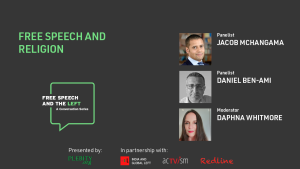This is the first of a three part series on postmodernism written by Daphna Whitmore and originally posted on Redline.
Postmodernism has long been looked upon as an indecipherable ideology and a source of amusement. In 1996 Alan Sokal, a physics professor at New York University, had a hoax article published in ‘Social Text’ an academic journal of postmodern cultural studies. In ‘Transgressing the Boundaries: Towards a Transformative Hermeneutics of Quantum Gravity‘ Sokal proposed that quantum gravity is a social and linguistic construct. Once published Sokal thoroughly exposed the ludicrousness of the ideology. Two decades later the joke is on society as postmodernism has spread into universities and now the indoctrinated are in positions of power.
This is part 1 of a 3 part series critique of postmodernism from the book Cynical Theories: How Universities Made Everything about Race, Gender, and Identity – and Why This Harms Everybody by Helen Pluckrose and James Lindsay. Swift Press 2020. The synopsis and commentary below is written by Daphna Whitmore.
 It was the 1960s that revolutionised social philosophy and began the radical worldview now known as postmodernism. French Theorists such as Michel Foucault, Jacques Derrida, and Jean-Fraçois Lyotard were key figures in laying the groundwork. The two World Wars and the rise of fascism had shaken Europe’s confidence in the notion of progress. There was also disillusionment with Marxism and the socialist states, and a decline of religious world views. Postmodernism came on the scene as a rejection of modernism and modernity.
It was the 1960s that revolutionised social philosophy and began the radical worldview now known as postmodernism. French Theorists such as Michel Foucault, Jacques Derrida, and Jean-Fraçois Lyotard were key figures in laying the groundwork. The two World Wars and the rise of fascism had shaken Europe’s confidence in the notion of progress. There was also disillusionment with Marxism and the socialist states, and a decline of religious world views. Postmodernism came on the scene as a rejection of modernism and modernity.
Postmodernist thinkers dismiss many planks of modern thought, such as the desire for authenticity, unifying narratives, universalism and progress, which are achieved primarily through scientific knowledge and technology. Where the modernists’ took a relatively measured skeptical view of tradition, religion, and Enlightenment-era certainty, the postmodernists raise skepticism to extreme cynicism.
Postmodernism isn’t just hard to define it is notoriously difficult to summarise. It is not one unitary movement, and it has spawned new forms over time with increasing influence over culture, activism and scholarship, spreading from the West to other regions.
In the sixties Marxism, which had been the main longstanding leftist social-justice cause, was beginning its decline, while a vibrant youth culture was beginning to form, producing a powerful popular culture. Technology was advancing rapidly enabling mass production of consumer goods.
There were fears that society was degenerating into a hedonistic consumeristic world of fantasy and play. This reaction often took the form of pessimism fueling fears about human hubris and the loss of meaning and authenticity. Postmodernism is particularly skeptical of science and other culturally dominant ways of legitimising claims as ‘truths’ and of grand, sweeping explanations, which they call metanarratives.
In the Enlightenment cultural skepticism was crucial to developing scientific thought. Christianity was reevaluated during the Reformation, and at the end of the sixteenth-century treatises against atheism began to appear indicating that disbelief in God had begun to circulate. The development of the scientific method in the nineteenth century was centered on skepticism and the need for increasingly rigorous testing and falsification.
A distinctive feature of postmodernists is they are overly concerned with language, and the ways in which language shapes social reality through its ability to constrain and shape knowledge – that which represents what is true. They not only doubt whether objective knowledge or truth is obtainable they have a commitment to cultural constructivism asserting that knowledge and reality are a product of their cultural context.
The postmodern political principle is a belief that society is formed of systems of power and hierarchies, which decide what can be known and how.
The four major themes of postmodernism are
- The blurring of boundaries
- The power of language
- Cultural relativism
- The loss of the individual and the universal
These themes could be described as the ‘postmodern metanarrative’. There is in postmodernism the doubting that any human truth provides an objective representation of reality. There is a focus on language and the way societies use it to create their own local realities and denying the universal.
This is a major shift from the modernist dichotomy between the objective universal and the subjective individual. The boundary between what is objectively true and what is subjectively experienced is not accepted. Knowledge, truth, meaning and morality are according to postmodernist thinking culturally constructed and relative products of individual cultures, none of which possess the necessary tools or terms to evaluate the others.
The blurring of the boundaries
Radical skepticism about objective reality and whether it is knowable results in suspicion of all boundaries and categories that previous thinkers widely accepted as true. Not only the boundaries between objective and subjective and between truth and belief, but also between science and the arts are blurred or rejected.
The power of language
Under postmodernism many ideas that were seen as objectively true came to be seen as mere constructions of language. Foucault refers to them as ‘discourses’ that construct knowledge. The most extreme obsession with language is seen with Derrida who rejects the commonsense idea that words refer straightforwardly to things in the real world. For Derrida language is unreliable and cannot represent reality or communicate it to others. He asserts the speaker’s meaning has no more authority than the hearer’s interpretation and thus intention cannot outweigh impact. Consequently, since discourses are believed to create and maintain oppression, they have to be carefully monitored and deconstructed. Derrida proposes we read ‘deconstructively’ by looking for internal inconsistencies in which a text contradicts or undermines itself. In practice, deconstructive approaches to language end up looking like nitpicking at words in order to deliberately miss the point. This is not some obscure academic issue, it is the outlook that is behind calls for laws to outlaw speech which may cause offense. If wise heads prevail we may be spared the nightmare in which subjective perception prevails over the intention of the speaker.
Cultural relativism
Because postmodernism holds that truth and knowledge are constructed by dominant discourses it maintains we cannot step outside our own system and categories in order to examine them from another vantage point. Therefore a meaningful critique of other cultures is impossible according to the postmodernists. Even critiquing one’s own culture or society is dependent on one’s position in the system, and therefore can be accepted or dismissed depending on a political assessment of the status of the critic’s position. The postmodernist social justice outlook has a hierarchy of oppressions which will be discussed in future posts.
The loss of the individual and the universal
Postmodernism considers the autonomous individual largely a myth. The individual is viewed as a product of powerful discourses and culturally constructed knowledge. The concept of the universal is also rejected and seen as an attempt to enforce dominant discourses on everybody. Postmodernism rejects the smallest unit in society – the individual – and the largest – humanity- and instead focuses on small, local groups as the producers of knowledge, values and discourses.
Isn’t postmodernism dead?
Many thought postmodernism had died out. The authors of Cynical Theories argue that it has merely matured, mutated and evolved. They maintain that the four themes discussed above remain pervasive and culturally influential. It is true that the proliferation of postmodern text from the sixties to the eighties did not continue into the 1990s. The early forms of postmodernism- with their ultimate meaninglessness, lack of direction, and concern only to deconstruct and disrupt could only last for so long. What followed, and what we live with today, is the next wave of activism-scholarship and applied postmodernism which will be discussed in future posts.
The authors of Cynical Theories touch on how Marxism has influenced postmodernism and also note some differences, but they do not delve much into how Marxian philosophy develops an understanding of objective reality and how it opposes postmodern orthodoxy. This is unsurprising as it is not the object of the book, and Pluckrose and Lindsay are not Marxists being more inclined to left-liberal ethics.
In contrast to postmodernism, Marxism holds that there is objective reality and it is knowable. That’s not to say that all things are known, as there are constantly new things developing and the old is dying; rather that valid and reliable knowledge can be obtained. Marxists consider knowledge arises first through the struggle for production – which sets humans off from the animal world – as it is the most fundamental and practical activity. Through sense perception, a level of perceptual knowledge develops of things and processes and as this perceptual knowledge increases concepts are formed and generalised ideas develop which enable us to understand whole classes of objects. With general concepts it is possible to draw conclusions and then test their validity. This return from rational knowledge to practical activity is how knowledge is deepened and refined. Scientific experiment is one aspect of human social practice in which knowledge is acquired.
Postmodernism in contrast to Marxism and the Enlightenment thinkers dismantles categories and makes coherent thought and discussion impossible.
In future synopses we will look at Queer Theory and Critical Race Theory.



